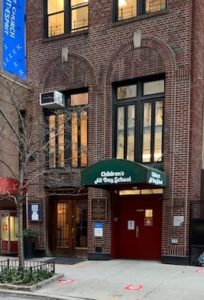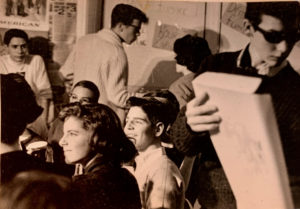We tend to take our strong aversions as a given, but behind them there surely lies an explanation and a story full of feeling. Recently, I had reason to recall my having once been so allergic to French as to have become entirely deaf-mute in the language, a condition I’d never questioned. So, when I went digging to make sense of it, I kept an eye out for where deep emotion might lurk.
First off, how did learning French ever became a “thing” in the life of a middle-class, Jewish child? It clearly began with my mother, a frighteningly hyper-critical business executive, for whom mastering French was a major life goal. She’d dreamed of going to the Sorbonne in Paris but with no money to get there settled for a public college in Manhattan, where she instead studied to teach French. She eventually got herself to Paris for a summer course but never cracked the code and was still enrolled in French conversation class when she died at 84.
As soon as I was old enough, she enrolled me in a French nursery school: École Française de Saint Esprit (the French School of the Holy Spirit). I wasn’t ready to leave my nanny Amy—the tall, matronly object of my adoration (who lived with us for the next seventy years)—and certainly not to a gray basement peopled exclusively with nuns in black habits. I hid in my locker every chance I got. Now, I remember my fearsome mother walking me to school on her way to work, taking me from Amy and delivering me to this grim underworld. In principal, the idea of early immersion in a foreign language is good. Children can learn multiple languages without effort, and I might have picked up French. But, under the circumstances, I didn’t.
And then, I couldn’t. Six years later, when French was introduced in the forth grade, I could repeat the sounds but heard only nonsense, a problem that persisted into high school, where grades mattered. The summer after tenth grade, I spent a month at a new, remedial French camp in Maine. The days of classes and evenings of French films had no impact on the impenetrable wall of meaningless sound I heard, but the camp was not a waste: I met Madame.
Madame was the head of the French department of The Brearley, a fancy girls school that had rejected me when I’d applied for ninth grade. She was teaching for the month to help a friend who’d started the camp, and I fell in love with her on sight. What was it about her? Now I realize that she reminded me of Amy. Tall and matronly, she was an exuberant, commanding version of my (much-disparaged, vulnerable) nanny. Picture Julia Childs, whose promise to teach me to cook similarly electrified me, ten years later. From Madame’s opaque speech I picked out…family…Lyons…village…Brearley girls (three of whom she’d have taken to France for the summer were she not in Maine). I passed this to my mother, who, after arriving to pick me up, cornered Madame and persuaded her to take me when she visited her elderly parents, the following week.
Thus, I found myself sharing a hotel room with someone whom I regarded as more like a Greek deity than an actual human being. The combination of our bizarre physical proximity and my paralyzing hero worship was acutely uncomfortable. Failing to find any path in the thick fog of Madame’s incomprehensible conversation, 24/7, returned me to École Française and the locker.
Life at her parents’ home was half dream, half nightmare. Her parents welcomed me shyly and offered fabulous things to eat. The house was set in an immense garden of edibles. I spent the days picking whatever luscious fruit was most ripe, which Grandmère then cooked into jam and a syrup she added to seltzer. Fortified with a memorized sentence, I walked twice a day to buy bread and was given a chunk of it with chocolate for afternoon snack, like all French children.
The nightmare part was my self-imposed isolation. At night I memorized textbook phrases I could use at the table: Voudrier-vous me faire passer le beurre? (Would you be so kind as to pass me the butter?). Every afternoon I had dictée, the dictation of a literary paragraph. All I could do was record the flow of gibberish and then try to cut it up into words familiar from written French.
One afternoon, Madame took me on a long walk to a distant village to visit a friend with whom she’d been in the French Resistance. We walked; she talked; I sat with the two women as they chatted away in a verbal blur. On the way home, Madame asked something about my best friend—her name?—and my mind went to the annual theme parties the two of us gave.
The first had been a beatnik party. We wrote the invitations on the back of a Ferlinghetti poem, covered the walls of my emptied bedroom in newspaper, and spent hours dripping candles onto empty wine bottles. Dressed in our idea of cool, we danced to Johnny Mathis and
the Everly Brothers. The second year, we used a Roman theme. We wrote the invitations in latin on scrolls sealed with wax, encircled our sheet-covered dining room floor with pillows, and served punch in coconut shells borrowed from a Chinese restaurant. We wore togas. Madame appeared to be fascinated. Halfway home, I realized we were speaking French.
The cause of my deaf-muteness was clear. You can’t learn to speak a foreign language without making mistakes, and I was used to the constant correction of my enunciation and word choice at home. What hope was there of getting anything right in a language I didn’t know? When Madame showed interest in the content of my speech rather than its form and delivery, my performance anxiety evaporated, and all the vocabulary and conjugations I’d memorized, all the language patterns and expressions I’d absorbed became accessible. Her focus on me banished my critical mother. Her speech broke into words, and I answered in a kind of fluent Frenglish; it just poured out.
What was the best part? Breaking down a wall I’d been beating my head against for twelve years? Joining the circle of my beaming French family, who’d been patiently waiting to hear what I had to say?
It was all a thrill, as is excavating what underlay this sequence of incidents—my helpless entrapment in my mother’s obsession, my traumatic separation from Amy (and the stubborn anger it provoked), my passionate transference to Madame—experiences I’d lived without ever noticing how the pieces of the puzzle all fell into place.



Merveilleuse! Made me realize that in the more than 50 years we’ve been friends, I’ve never heard you speak French. And never knew French played such an important role in your life.
I love this! So did you end up at Brearley after all?
No, and I seem to remember that Madame interviewed me. This may be a false memory, and I don’t think she would have remembered if she had, so I never asked her about it. In my memory she was kind. But, of course, I could hardly have made a good impression!
I liked your story so far. Caught my interest and I would enjoy hearing more.
My inability to speak French, I see now, stems from the constant humiliation I suffered whenever I spoke. My “Madame” was Madame David, ogre-like teacher of French at the convent school I attended for the last two years of high school. I never could pass muster in spoken French language, and it was largely due to the fearsome glare of Madame whenever I spoke and my pronunciation was wrong, and she would roll her eyes and wave her hand in a gesture of disgust. And then there were the many rebuffs by the unforgiving French people, who, once I got to Paris, would refuse to understand me and I became so self-conscious and timid I could barely squeak out a simple request.
Then it all changed (well, at least temporarily) when the car my husband and Iwere driving from Nice to Lyon began making loud banging noises and we pulled off to the side. I hiked down the road to a nearby gas station and explained our situation to a mechanic in clear French, and he in turn told me, in French, what to do – start the car, drive slowly to the gas station, where he diagnosed the problem (no oil) and fixed it, then told me to drive very slowly – “doucement, doucement!” back to the car rental place. It was an emergency, my French vocabulary just poured out, no time to think about pronunciation.
OMG! Exactly the same experience — and with French!
How wonderful that you are conducting a psychoanalysis with you as analyst and patient. A new level of self understanding.
I’d always realized that my deaf-muteness was tripped off my the French nursery school, but I just wrote it off to the nuns. That the bigger factor was the role of Amy became obvious when I started to think about it in greater depth and to reconnect with the memory of being walked there by my mother. By the way, the place is still there on 60th St. off Park, but now it looks like a lovely place — no nuns and it’s no longer French-speaking. It was fun to find all the parts of the puzzle, just below the surface. Amazing that I never wondered about it before; it was such a bizarre aspect of my childhood!
ah Hah! Now I know why you were reluctant to speak to me in French after I learned that you were studying it. I certainly hope I don’t remind you of your Mother!!!
You certainly do not!
I love your writing Elizabeth! And I so appreciate your willingness to share your stories. I always look forward to reading more, and of course would love to see you too!
How wonderful of you to write! Such a truly lovely surprise. Hopefully, we can be together sometime soon!
Many of my grade school neighborhood friends were sent to learn french from a local widowed teacher. I think all of our parents did this in an effort to keep her afloat financially. I couldn’t get the pronunciations right and always mixed up words. To this day my three years of language torture has left me with the ability to count to twenty and greet people.
Believe me, I get it!
Elizabeth… this is a fabulous description of such a familiar situation of the terrifying struggle with French … a language which is also something which I have never mastered…
It strikes me that there is a certain irony of the proximity of the French Library to many of the participants in this conversation., Despite the proximity and convenient classes.. it never occurred to me to “try, try again” !!
I think that train has left the station, Suzanne! When I did try, try again, discovering how much I had forgotten was more of a confrontation with aging than I wanted to have. On the other hand, I can now walk past the building without the slightest frisson of regret!